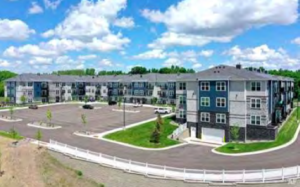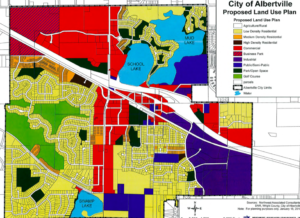A 2.5 hour Albertville city council meeting ended Monday evening with both an approval and a resignation. The council voted 4-1 in favor of developing the long-vacant Heuring Meadows parcel, and the lone dissenting voice, 25-year council veteran John Vetsch, resigned in protest after the vote. Vetsch said he did not believe this was the right space for the project and felt this land should remain vacant until a suitable commercial development comes along. Vetsch served on the Albertville city council from 1993-2003 and then again from 2005-2020.
The 11.5-acre parcel, located off CSAH 19 just north of 53rd St., will be developed to include a Goddard School daycare center, a 159-unit market rate apartment complex, and 26 units of attached townhomes. Last month, Albertville’s planning commission voted against this project 4-1 after a lengthy public hearing.


The market-rate apartments, which are not subsidized housing, will include studio, one and two bedroom units with rental rates between $1,000-$1,700 per month. The three-bedroom townhomes will rent for $1,200-$1,800 per month. Developers said the new units will feature amenities not available anywhere else in Albertville’s high-density housing stock, such as underground heated parking, large playground equipment, stainless steel appliances, a fitness facility, and 24-hour on-site management.
Addressing Concerns
City engineer Al Brixius went through a lengthy list of residents’ concerns about the proposed development and provided information to counter those concerns.
For residents with traffic concerns, he said a traffic study revealed this proposal would result in roughly half of the expected traffic count increases than if the space were developed at 100 percent commercial. The project will include a new stoplight at the intersection of Highway 19 and 53rd Street.
For residents concerned that the space should be reserved for commercial development, Brixius said the council has not received a single inquiry for commercial development on the property since it was platted in 2001. He said the city still has 340 acres of land dedicated to future commercial and industrial development.

The areas in red represent available commercial/industrial land in Albertville
Brixius also discussed the changing retail landscape due to what he called the “Amazon effect,” where brick and mortar business development is becoming increasingly scarce due to changing consumer shopping habits and high retail lease rates. The developed property is estimated to generate $405,900 in annual tax revenue, with the apartment building bringing in $43,478 per acre, the townhomes bringing in $56,100 per acre and the commercial daycare bringing in $53,800 per acre.
For those concerned about school crowding, Brixius said the developer estimates no more than 30 percent of the units will house school-age children. He said the superintendent of STMA schools has gone over the plans and said there is capacity for the development.
For those concerned about depreciation in property values for adjacent homeowners, Brixius said studies on the issue have not proven that to be true. He said the new townhomes will create a buffer between the single family homes that back up to the parcel and the high-density apartment complex at the center. Some property owners’ lots will back up to the commercial daycare center or pond on the southern edge of the property.
For those who expressed concern about the crime that high-density housing would bring, Brixius said similar market-rate projects report 0-10 police calls to their sites annually. The developers said they would take several steps to screen potential tenants, including criminal background checks, credit and rental history. They also said they would have systems in place to manage any problem renters. The developers said they expect to fill the units within one year and would not lower their standards to fill units.
Council Decision
Councilmember Aaron Cocking said he’d love to see commercial development fill that entire space, but he doesn’t feel it makes sense to continue subsidizing this land when proposed development would benefit the community as a whole.
“How long do the rest of the residents of the city of Albertville end up subsidizing the cost of this piece of property for some possible development that might come down the road?” he asked. “As a resident of the city of Albertville, if I find out we had a tangible proposal come before us with the potential to offset $500,000 of property taxes, and we turn it down, but why? For a Panera or a YMCA or a Foss, which I’d love … but they’re not knocking down our doors, which for me is what it comes down to. At some point, we have to deal with what’s in front of us.”
Cocking said he feels the council has the obligation to keep the community’s long-term best interest in mind, and he said he feels this project fills a housing gap in town that needs to be filled. He said he constantly hears constituents ask why Albertville doesn’t have big-city amenities like a YMCA and popular chain restaurants, but on the other hand residents don’t want to see Albertville change its small-town feel.
Mayor Jillian Hendrickson mentioned that local companies who employ laborers say their employees have a hard time finding suitably priced housing in town, and she said restaurant owners have said the same thing. She said the council heard from residents who want to stay local but do not have enough money for a down payment on a house and do not approve of the city’s current apartment options.
“I think this is good fit for our community overall,” she said.
The atmosphere in the council chamber was tense at meeting’s end, with some attendees confronting council members and city staff.